MGT2BET Business Ethics Report: Ethical Theories and CSR Analysis
VerifiedAdded on 2022/12/05
|9
|1752
|405
Report
AI Summary
This report delves into the realm of business ethics, exploring key concepts and theories. It begins by defining and analyzing utilitarianism as an ethical framework, examining its application in business decision-making, and highlighting its strengths and limitations. The report then transitions to discuss globalization, outlining its advantages such as poverty reduction, new industry development, and market expansion. Finally, it explores corporate social responsibility (CSR), defining its core principles and examining its impact on environmental protection, legal and political considerations, economic growth, and social welfare. The report provides a comprehensive overview of these interconnected topics, offering valuable insights into the ethical considerations that shape modern business practices and the role of corporations in a globalized world. The report is a contribution to Desklib, a platform providing AI based study tools for students.
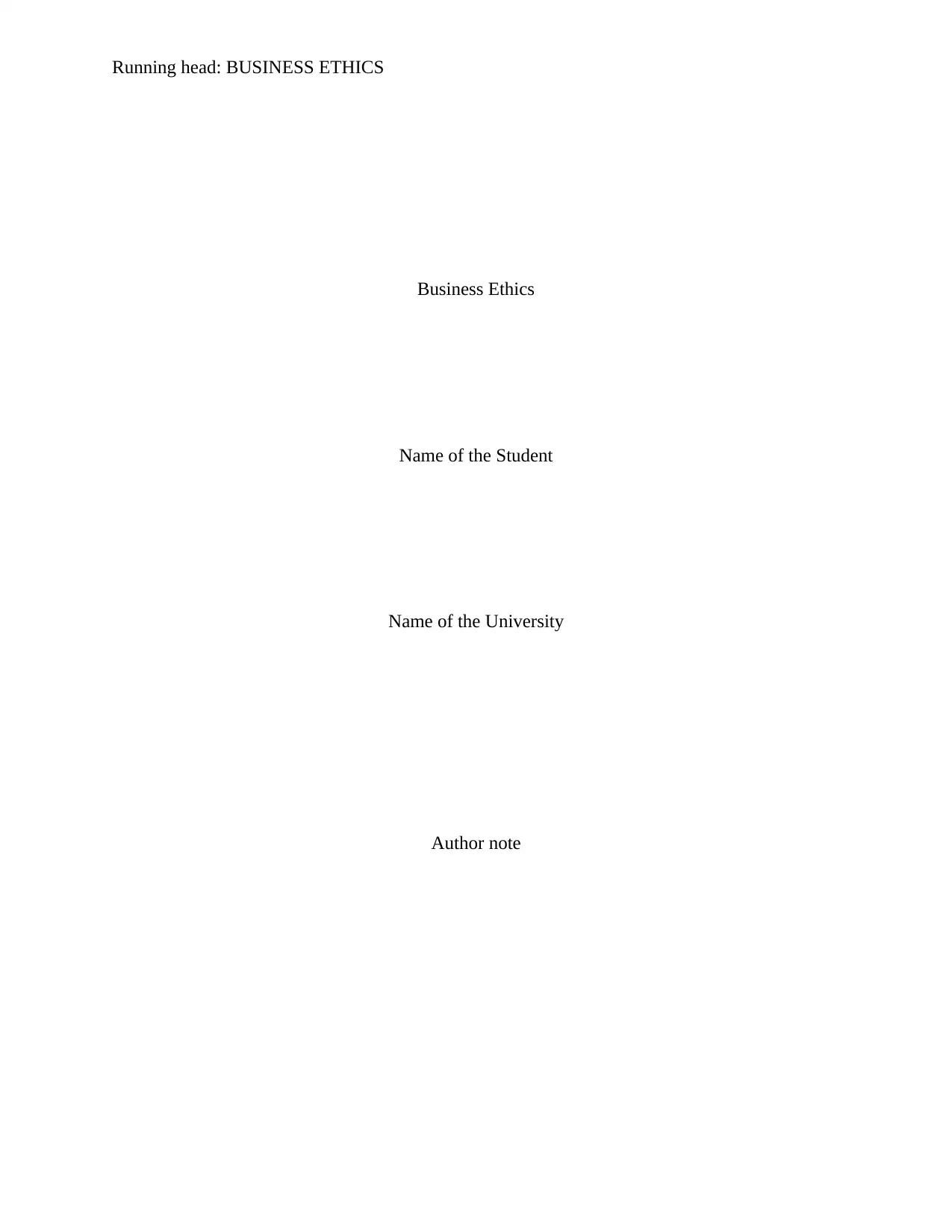
Running head: BUSINESS ETHICS
Business Ethics
Name of the Student
Name of the University
Author note
Business Ethics
Name of the Student
Name of the University
Author note
Paraphrase This Document
Need a fresh take? Get an instant paraphrase of this document with our AI Paraphraser
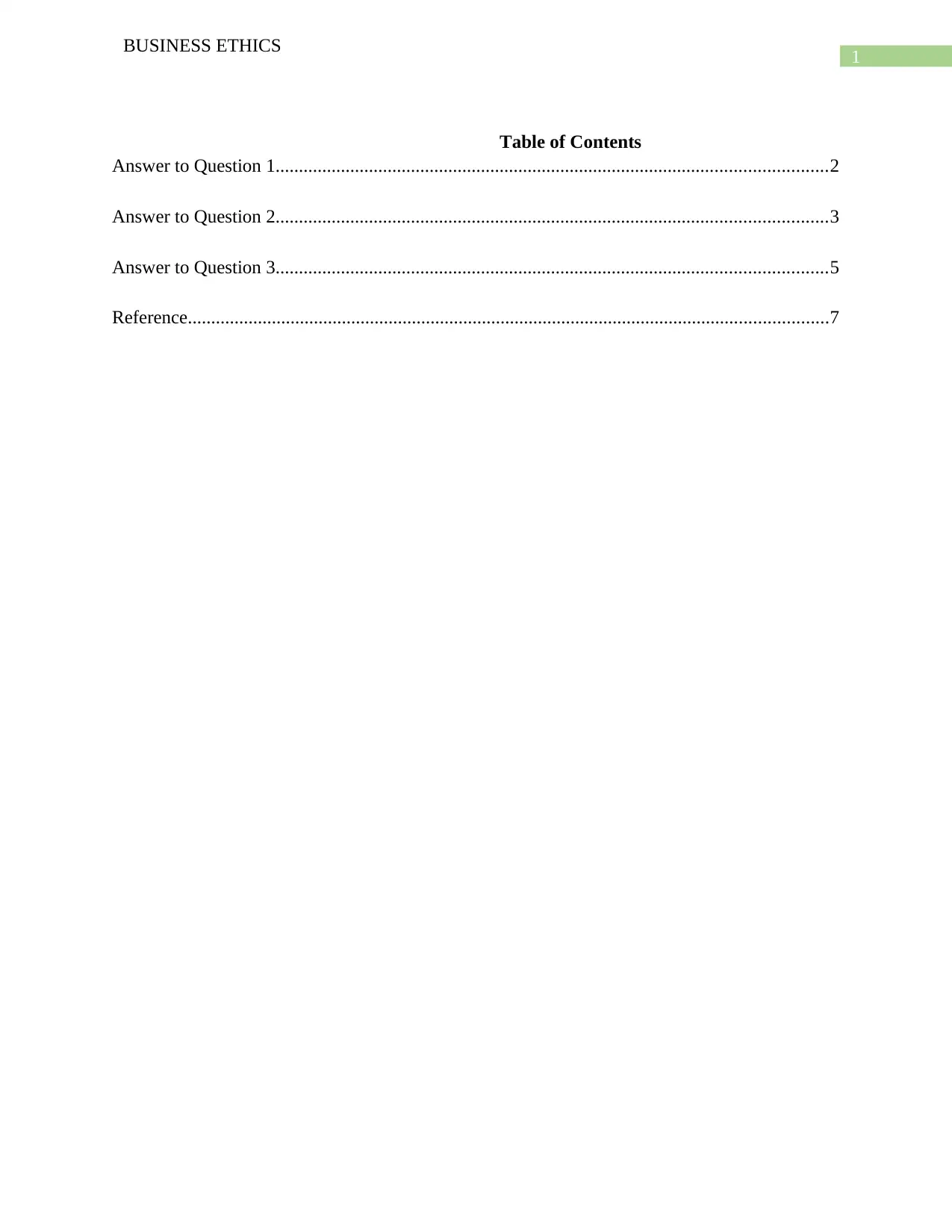
1
BUSINESS ETHICS
Table of Contents
Answer to Question 1......................................................................................................................2
Answer to Question 2......................................................................................................................3
Answer to Question 3......................................................................................................................5
Reference.........................................................................................................................................7
BUSINESS ETHICS
Table of Contents
Answer to Question 1......................................................................................................................2
Answer to Question 2......................................................................................................................3
Answer to Question 3......................................................................................................................5
Reference.........................................................................................................................................7
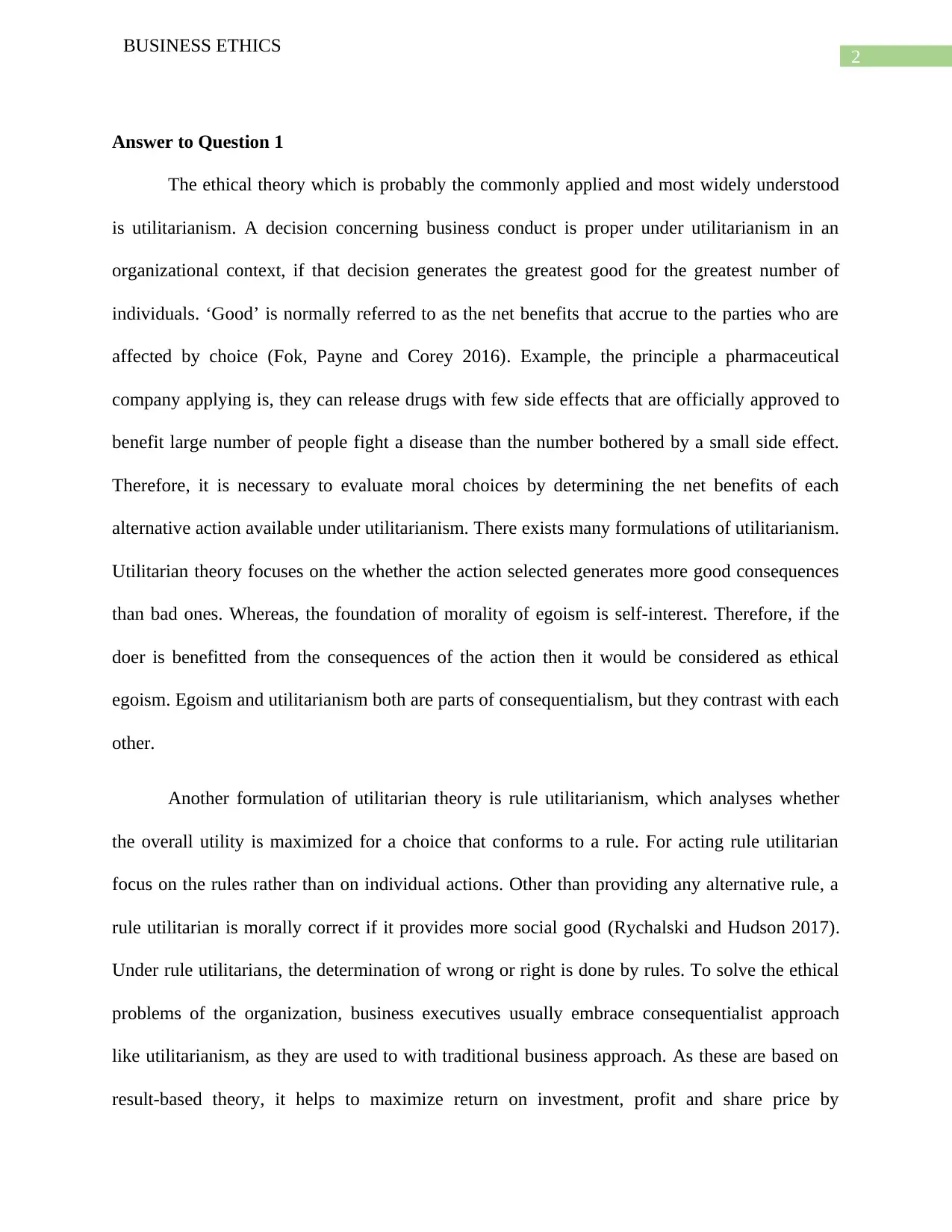
2
BUSINESS ETHICS
Answer to Question 1
The ethical theory which is probably the commonly applied and most widely understood
is utilitarianism. A decision concerning business conduct is proper under utilitarianism in an
organizational context, if that decision generates the greatest good for the greatest number of
individuals. ‘Good’ is normally referred to as the net benefits that accrue to the parties who are
affected by choice (Fok, Payne and Corey 2016). Example, the principle a pharmaceutical
company applying is, they can release drugs with few side effects that are officially approved to
benefit large number of people fight a disease than the number bothered by a small side effect.
Therefore, it is necessary to evaluate moral choices by determining the net benefits of each
alternative action available under utilitarianism. There exists many formulations of utilitarianism.
Utilitarian theory focuses on the whether the action selected generates more good consequences
than bad ones. Whereas, the foundation of morality of egoism is self-interest. Therefore, if the
doer is benefitted from the consequences of the action then it would be considered as ethical
egoism. Egoism and utilitarianism both are parts of consequentialism, but they contrast with each
other.
Another formulation of utilitarian theory is rule utilitarianism, which analyses whether
the overall utility is maximized for a choice that conforms to a rule. For acting rule utilitarian
focus on the rules rather than on individual actions. Other than providing any alternative rule, a
rule utilitarian is morally correct if it provides more social good (Rychalski and Hudson 2017).
Under rule utilitarians, the determination of wrong or right is done by rules. To solve the ethical
problems of the organization, business executives usually embrace consequentialist approach
like utilitarianism, as they are used to with traditional business approach. As these are based on
result-based theory, it helps to maximize return on investment, profit and share price by
BUSINESS ETHICS
Answer to Question 1
The ethical theory which is probably the commonly applied and most widely understood
is utilitarianism. A decision concerning business conduct is proper under utilitarianism in an
organizational context, if that decision generates the greatest good for the greatest number of
individuals. ‘Good’ is normally referred to as the net benefits that accrue to the parties who are
affected by choice (Fok, Payne and Corey 2016). Example, the principle a pharmaceutical
company applying is, they can release drugs with few side effects that are officially approved to
benefit large number of people fight a disease than the number bothered by a small side effect.
Therefore, it is necessary to evaluate moral choices by determining the net benefits of each
alternative action available under utilitarianism. There exists many formulations of utilitarianism.
Utilitarian theory focuses on the whether the action selected generates more good consequences
than bad ones. Whereas, the foundation of morality of egoism is self-interest. Therefore, if the
doer is benefitted from the consequences of the action then it would be considered as ethical
egoism. Egoism and utilitarianism both are parts of consequentialism, but they contrast with each
other.
Another formulation of utilitarian theory is rule utilitarianism, which analyses whether
the overall utility is maximized for a choice that conforms to a rule. For acting rule utilitarian
focus on the rules rather than on individual actions. Other than providing any alternative rule, a
rule utilitarian is morally correct if it provides more social good (Rychalski and Hudson 2017).
Under rule utilitarians, the determination of wrong or right is done by rules. To solve the ethical
problems of the organization, business executives usually embrace consequentialist approach
like utilitarianism, as they are used to with traditional business approach. As these are based on
result-based theory, it helps to maximize return on investment, profit and share price by
⊘ This is a preview!⊘
Do you want full access?
Subscribe today to unlock all pages.

Trusted by 1+ million students worldwide
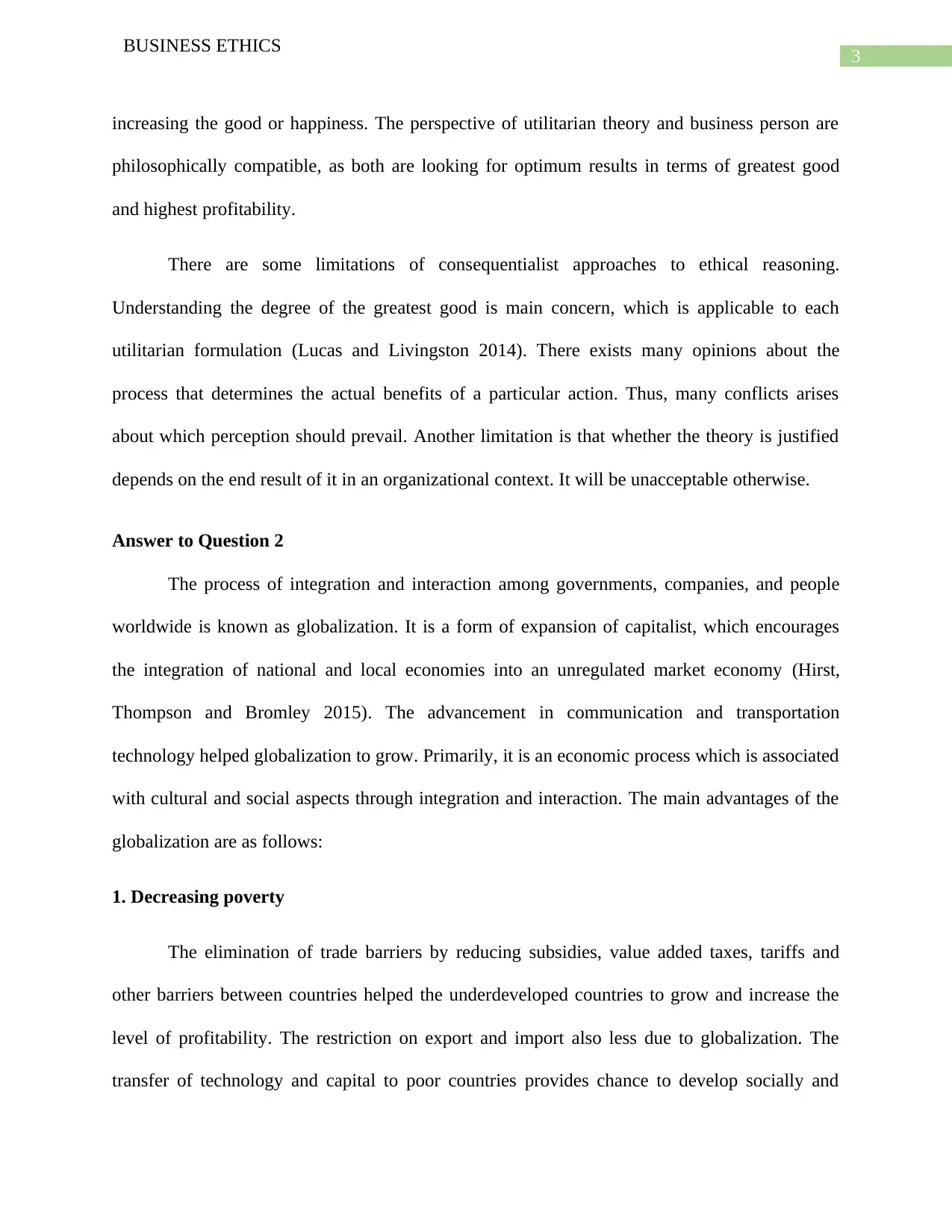
3
BUSINESS ETHICS
increasing the good or happiness. The perspective of utilitarian theory and business person are
philosophically compatible, as both are looking for optimum results in terms of greatest good
and highest profitability.
There are some limitations of consequentialist approaches to ethical reasoning.
Understanding the degree of the greatest good is main concern, which is applicable to each
utilitarian formulation (Lucas and Livingston 2014). There exists many opinions about the
process that determines the actual benefits of a particular action. Thus, many conflicts arises
about which perception should prevail. Another limitation is that whether the theory is justified
depends on the end result of it in an organizational context. It will be unacceptable otherwise.
Answer to Question 2
The process of integration and interaction among governments, companies, and people
worldwide is known as globalization. It is a form of expansion of capitalist, which encourages
the integration of national and local economies into an unregulated market economy (Hirst,
Thompson and Bromley 2015). The advancement in communication and transportation
technology helped globalization to grow. Primarily, it is an economic process which is associated
with cultural and social aspects through integration and interaction. The main advantages of the
globalization are as follows:
1. Decreasing poverty
The elimination of trade barriers by reducing subsidies, value added taxes, tariffs and
other barriers between countries helped the underdeveloped countries to grow and increase the
level of profitability. The restriction on export and import also less due to globalization. The
transfer of technology and capital to poor countries provides chance to develop socially and
BUSINESS ETHICS
increasing the good or happiness. The perspective of utilitarian theory and business person are
philosophically compatible, as both are looking for optimum results in terms of greatest good
and highest profitability.
There are some limitations of consequentialist approaches to ethical reasoning.
Understanding the degree of the greatest good is main concern, which is applicable to each
utilitarian formulation (Lucas and Livingston 2014). There exists many opinions about the
process that determines the actual benefits of a particular action. Thus, many conflicts arises
about which perception should prevail. Another limitation is that whether the theory is justified
depends on the end result of it in an organizational context. It will be unacceptable otherwise.
Answer to Question 2
The process of integration and interaction among governments, companies, and people
worldwide is known as globalization. It is a form of expansion of capitalist, which encourages
the integration of national and local economies into an unregulated market economy (Hirst,
Thompson and Bromley 2015). The advancement in communication and transportation
technology helped globalization to grow. Primarily, it is an economic process which is associated
with cultural and social aspects through integration and interaction. The main advantages of the
globalization are as follows:
1. Decreasing poverty
The elimination of trade barriers by reducing subsidies, value added taxes, tariffs and
other barriers between countries helped the underdeveloped countries to grow and increase the
level of profitability. The restriction on export and import also less due to globalization. The
transfer of technology and capital to poor countries provides chance to develop socially and
Paraphrase This Document
Need a fresh take? Get an instant paraphrase of this document with our AI Paraphraser
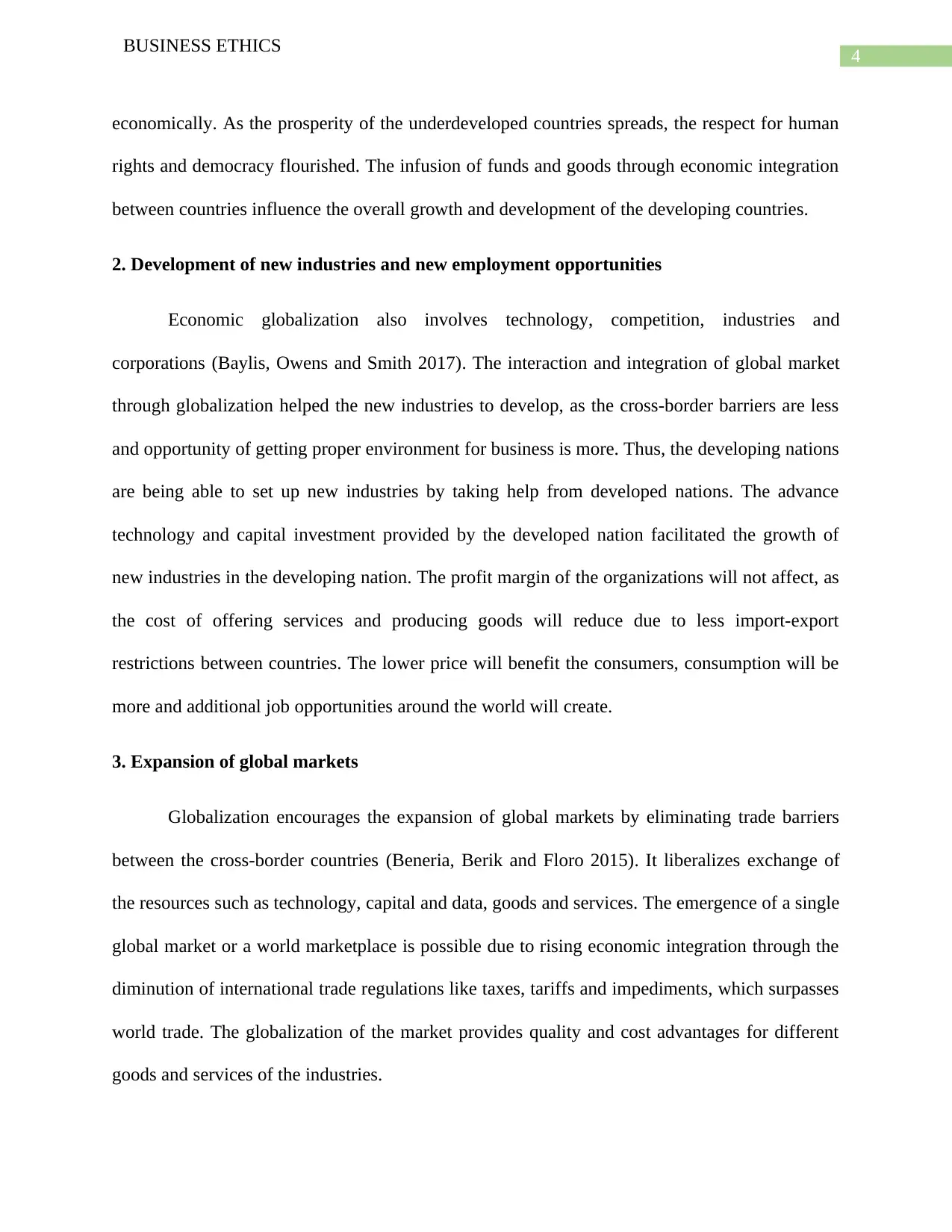
4
BUSINESS ETHICS
economically. As the prosperity of the underdeveloped countries spreads, the respect for human
rights and democracy flourished. The infusion of funds and goods through economic integration
between countries influence the overall growth and development of the developing countries.
2. Development of new industries and new employment opportunities
Economic globalization also involves technology, competition, industries and
corporations (Baylis, Owens and Smith 2017). The interaction and integration of global market
through globalization helped the new industries to develop, as the cross-border barriers are less
and opportunity of getting proper environment for business is more. Thus, the developing nations
are being able to set up new industries by taking help from developed nations. The advance
technology and capital investment provided by the developed nation facilitated the growth of
new industries in the developing nation. The profit margin of the organizations will not affect, as
the cost of offering services and producing goods will reduce due to less import-export
restrictions between countries. The lower price will benefit the consumers, consumption will be
more and additional job opportunities around the world will create.
3. Expansion of global markets
Globalization encourages the expansion of global markets by eliminating trade barriers
between the cross-border countries (Beneria, Berik and Floro 2015). It liberalizes exchange of
the resources such as technology, capital and data, goods and services. The emergence of a single
global market or a world marketplace is possible due to rising economic integration through the
diminution of international trade regulations like taxes, tariffs and impediments, which surpasses
world trade. The globalization of the market provides quality and cost advantages for different
goods and services of the industries.
BUSINESS ETHICS
economically. As the prosperity of the underdeveloped countries spreads, the respect for human
rights and democracy flourished. The infusion of funds and goods through economic integration
between countries influence the overall growth and development of the developing countries.
2. Development of new industries and new employment opportunities
Economic globalization also involves technology, competition, industries and
corporations (Baylis, Owens and Smith 2017). The interaction and integration of global market
through globalization helped the new industries to develop, as the cross-border barriers are less
and opportunity of getting proper environment for business is more. Thus, the developing nations
are being able to set up new industries by taking help from developed nations. The advance
technology and capital investment provided by the developed nation facilitated the growth of
new industries in the developing nation. The profit margin of the organizations will not affect, as
the cost of offering services and producing goods will reduce due to less import-export
restrictions between countries. The lower price will benefit the consumers, consumption will be
more and additional job opportunities around the world will create.
3. Expansion of global markets
Globalization encourages the expansion of global markets by eliminating trade barriers
between the cross-border countries (Beneria, Berik and Floro 2015). It liberalizes exchange of
the resources such as technology, capital and data, goods and services. The emergence of a single
global market or a world marketplace is possible due to rising economic integration through the
diminution of international trade regulations like taxes, tariffs and impediments, which surpasses
world trade. The globalization of the market provides quality and cost advantages for different
goods and services of the industries.
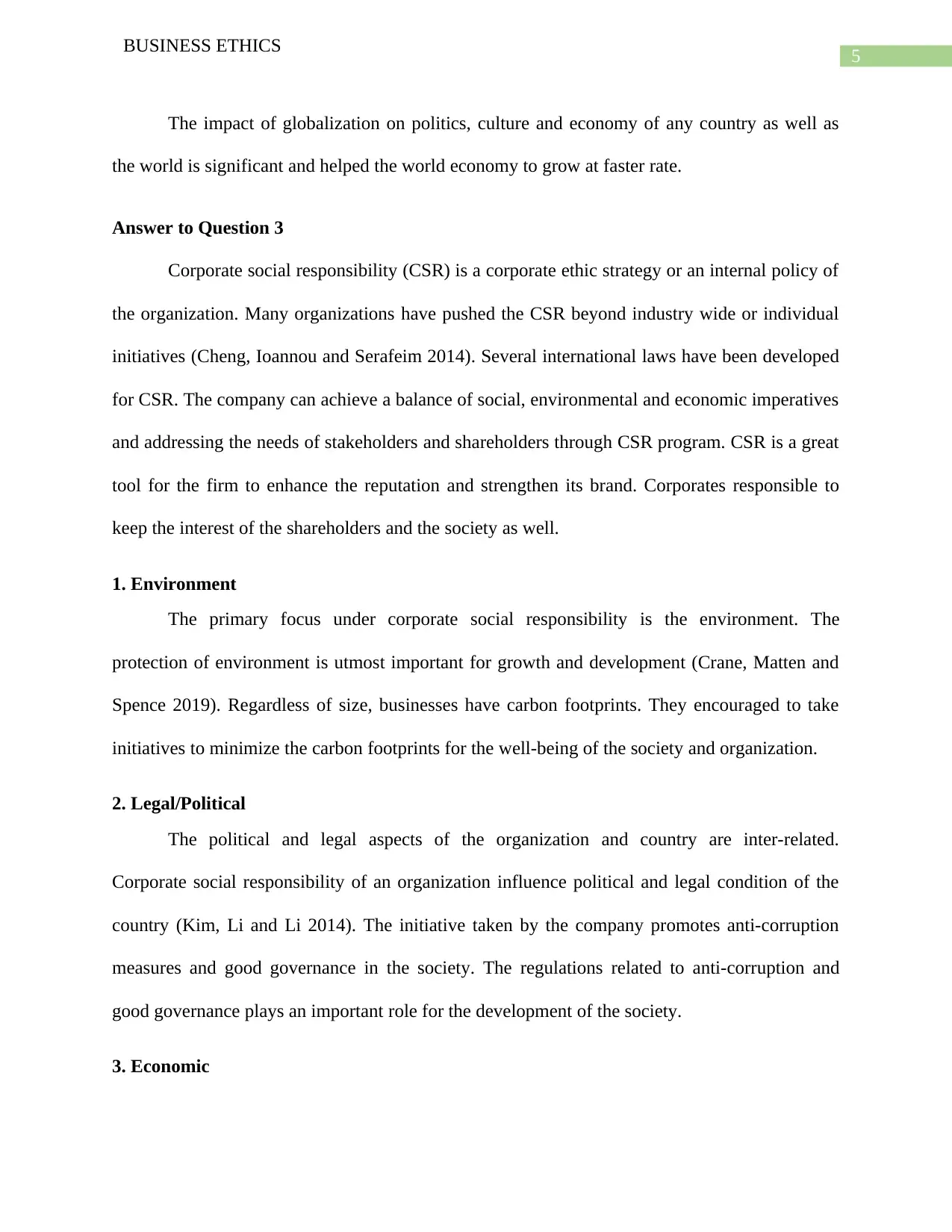
5
BUSINESS ETHICS
The impact of globalization on politics, culture and economy of any country as well as
the world is significant and helped the world economy to grow at faster rate.
Answer to Question 3
Corporate social responsibility (CSR) is a corporate ethic strategy or an internal policy of
the organization. Many organizations have pushed the CSR beyond industry wide or individual
initiatives (Cheng, Ioannou and Serafeim 2014). Several international laws have been developed
for CSR. The company can achieve a balance of social, environmental and economic imperatives
and addressing the needs of stakeholders and shareholders through CSR program. CSR is a great
tool for the firm to enhance the reputation and strengthen its brand. Corporates responsible to
keep the interest of the shareholders and the society as well.
1. Environment
The primary focus under corporate social responsibility is the environment. The
protection of environment is utmost important for growth and development (Crane, Matten and
Spence 2019). Regardless of size, businesses have carbon footprints. They encouraged to take
initiatives to minimize the carbon footprints for the well-being of the society and organization.
2. Legal/Political
The political and legal aspects of the organization and country are inter-related.
Corporate social responsibility of an organization influence political and legal condition of the
country (Kim, Li and Li 2014). The initiative taken by the company promotes anti-corruption
measures and good governance in the society. The regulations related to anti-corruption and
good governance plays an important role for the development of the society.
3. Economic
BUSINESS ETHICS
The impact of globalization on politics, culture and economy of any country as well as
the world is significant and helped the world economy to grow at faster rate.
Answer to Question 3
Corporate social responsibility (CSR) is a corporate ethic strategy or an internal policy of
the organization. Many organizations have pushed the CSR beyond industry wide or individual
initiatives (Cheng, Ioannou and Serafeim 2014). Several international laws have been developed
for CSR. The company can achieve a balance of social, environmental and economic imperatives
and addressing the needs of stakeholders and shareholders through CSR program. CSR is a great
tool for the firm to enhance the reputation and strengthen its brand. Corporates responsible to
keep the interest of the shareholders and the society as well.
1. Environment
The primary focus under corporate social responsibility is the environment. The
protection of environment is utmost important for growth and development (Crane, Matten and
Spence 2019). Regardless of size, businesses have carbon footprints. They encouraged to take
initiatives to minimize the carbon footprints for the well-being of the society and organization.
2. Legal/Political
The political and legal aspects of the organization and country are inter-related.
Corporate social responsibility of an organization influence political and legal condition of the
country (Kim, Li and Li 2014). The initiative taken by the company promotes anti-corruption
measures and good governance in the society. The regulations related to anti-corruption and
good governance plays an important role for the development of the society.
3. Economic
⊘ This is a preview!⊘
Do you want full access?
Subscribe today to unlock all pages.

Trusted by 1+ million students worldwide
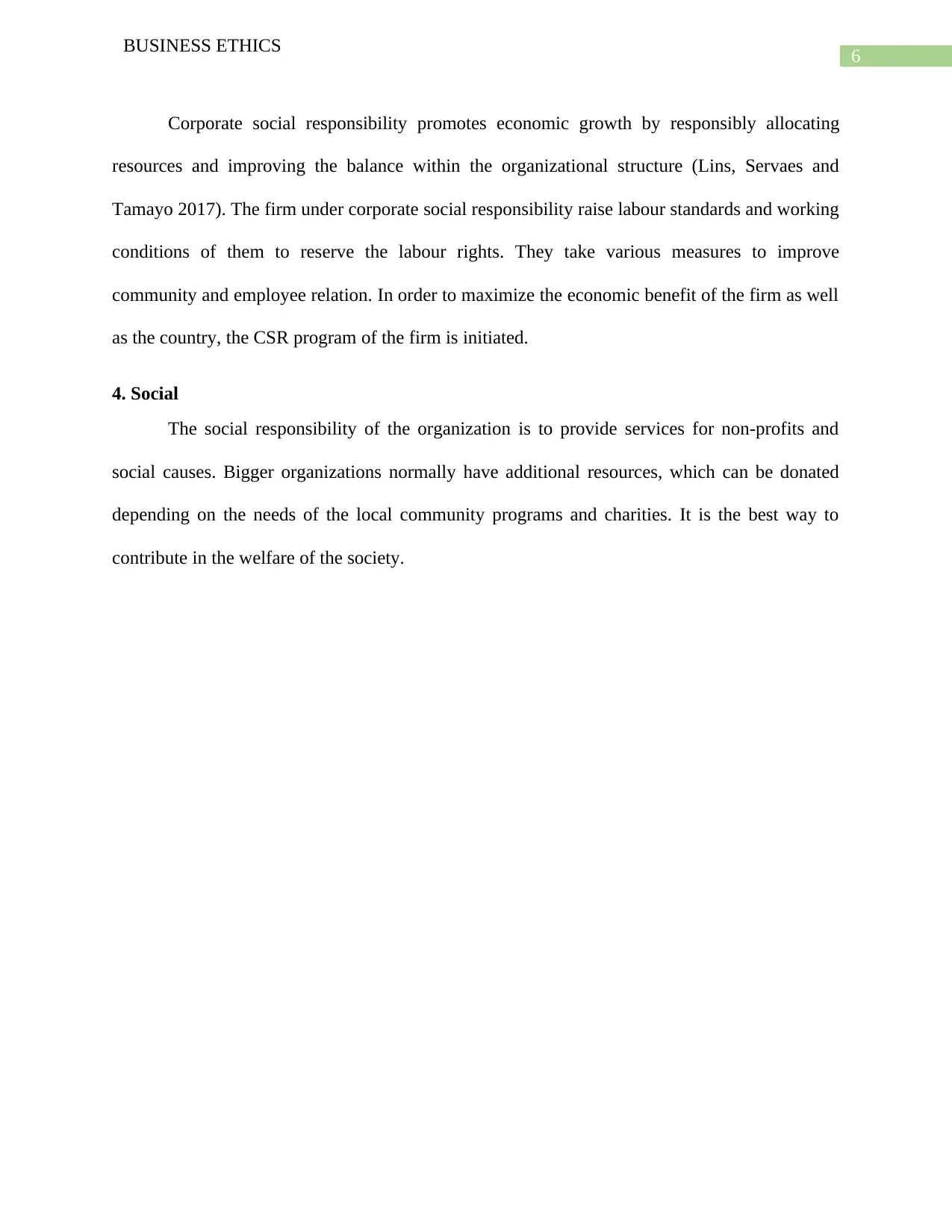
6
BUSINESS ETHICS
Corporate social responsibility promotes economic growth by responsibly allocating
resources and improving the balance within the organizational structure (Lins, Servaes and
Tamayo 2017). The firm under corporate social responsibility raise labour standards and working
conditions of them to reserve the labour rights. They take various measures to improve
community and employee relation. In order to maximize the economic benefit of the firm as well
as the country, the CSR program of the firm is initiated.
4. Social
The social responsibility of the organization is to provide services for non-profits and
social causes. Bigger organizations normally have additional resources, which can be donated
depending on the needs of the local community programs and charities. It is the best way to
contribute in the welfare of the society.
BUSINESS ETHICS
Corporate social responsibility promotes economic growth by responsibly allocating
resources and improving the balance within the organizational structure (Lins, Servaes and
Tamayo 2017). The firm under corporate social responsibility raise labour standards and working
conditions of them to reserve the labour rights. They take various measures to improve
community and employee relation. In order to maximize the economic benefit of the firm as well
as the country, the CSR program of the firm is initiated.
4. Social
The social responsibility of the organization is to provide services for non-profits and
social causes. Bigger organizations normally have additional resources, which can be donated
depending on the needs of the local community programs and charities. It is the best way to
contribute in the welfare of the society.
Paraphrase This Document
Need a fresh take? Get an instant paraphrase of this document with our AI Paraphraser
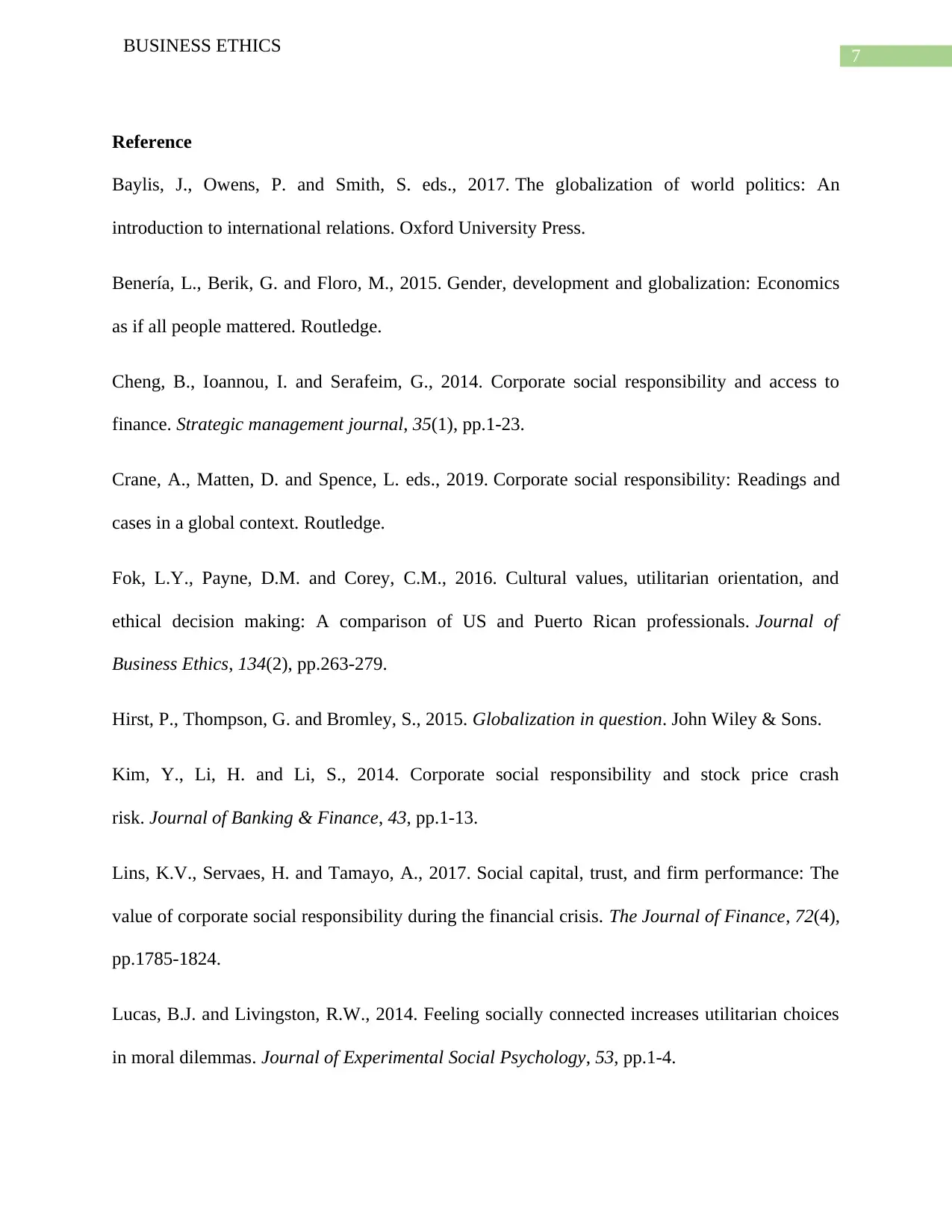
7
BUSINESS ETHICS
Reference
Baylis, J., Owens, P. and Smith, S. eds., 2017. The globalization of world politics: An
introduction to international relations. Oxford University Press.
Benería, L., Berik, G. and Floro, M., 2015. Gender, development and globalization: Economics
as if all people mattered. Routledge.
Cheng, B., Ioannou, I. and Serafeim, G., 2014. Corporate social responsibility and access to
finance. Strategic management journal, 35(1), pp.1-23.
Crane, A., Matten, D. and Spence, L. eds., 2019. Corporate social responsibility: Readings and
cases in a global context. Routledge.
Fok, L.Y., Payne, D.M. and Corey, C.M., 2016. Cultural values, utilitarian orientation, and
ethical decision making: A comparison of US and Puerto Rican professionals. Journal of
Business Ethics, 134(2), pp.263-279.
Hirst, P., Thompson, G. and Bromley, S., 2015. Globalization in question. John Wiley & Sons.
Kim, Y., Li, H. and Li, S., 2014. Corporate social responsibility and stock price crash
risk. Journal of Banking & Finance, 43, pp.1-13.
Lins, K.V., Servaes, H. and Tamayo, A., 2017. Social capital, trust, and firm performance: The
value of corporate social responsibility during the financial crisis. The Journal of Finance, 72(4),
pp.1785-1824.
Lucas, B.J. and Livingston, R.W., 2014. Feeling socially connected increases utilitarian choices
in moral dilemmas. Journal of Experimental Social Psychology, 53, pp.1-4.
BUSINESS ETHICS
Reference
Baylis, J., Owens, P. and Smith, S. eds., 2017. The globalization of world politics: An
introduction to international relations. Oxford University Press.
Benería, L., Berik, G. and Floro, M., 2015. Gender, development and globalization: Economics
as if all people mattered. Routledge.
Cheng, B., Ioannou, I. and Serafeim, G., 2014. Corporate social responsibility and access to
finance. Strategic management journal, 35(1), pp.1-23.
Crane, A., Matten, D. and Spence, L. eds., 2019. Corporate social responsibility: Readings and
cases in a global context. Routledge.
Fok, L.Y., Payne, D.M. and Corey, C.M., 2016. Cultural values, utilitarian orientation, and
ethical decision making: A comparison of US and Puerto Rican professionals. Journal of
Business Ethics, 134(2), pp.263-279.
Hirst, P., Thompson, G. and Bromley, S., 2015. Globalization in question. John Wiley & Sons.
Kim, Y., Li, H. and Li, S., 2014. Corporate social responsibility and stock price crash
risk. Journal of Banking & Finance, 43, pp.1-13.
Lins, K.V., Servaes, H. and Tamayo, A., 2017. Social capital, trust, and firm performance: The
value of corporate social responsibility during the financial crisis. The Journal of Finance, 72(4),
pp.1785-1824.
Lucas, B.J. and Livingston, R.W., 2014. Feeling socially connected increases utilitarian choices
in moral dilemmas. Journal of Experimental Social Psychology, 53, pp.1-4.
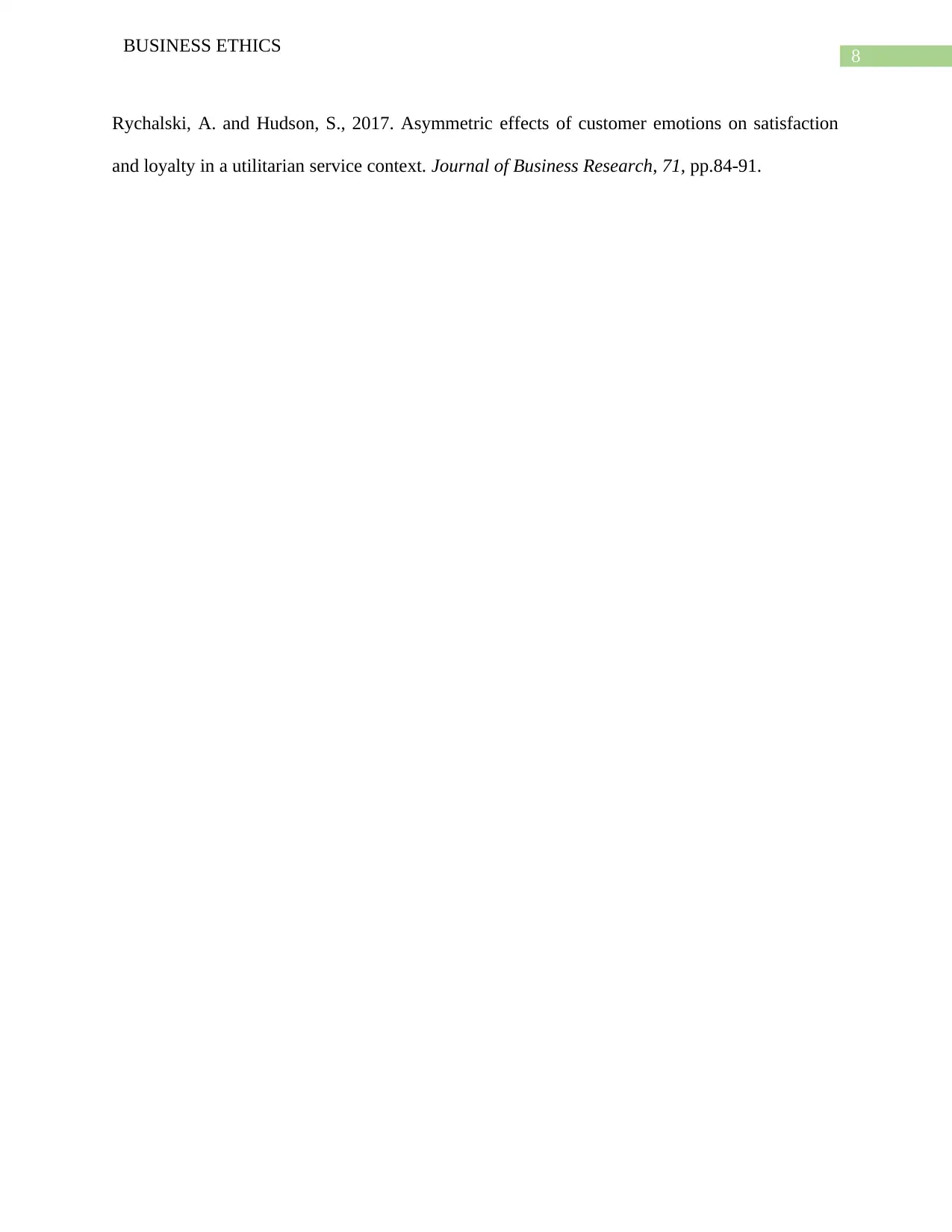
8
BUSINESS ETHICS
Rychalski, A. and Hudson, S., 2017. Asymmetric effects of customer emotions on satisfaction
and loyalty in a utilitarian service context. Journal of Business Research, 71, pp.84-91.
BUSINESS ETHICS
Rychalski, A. and Hudson, S., 2017. Asymmetric effects of customer emotions on satisfaction
and loyalty in a utilitarian service context. Journal of Business Research, 71, pp.84-91.
⊘ This is a preview!⊘
Do you want full access?
Subscribe today to unlock all pages.

Trusted by 1+ million students worldwide
1 out of 9
Related Documents
Your All-in-One AI-Powered Toolkit for Academic Success.
+13062052269
info@desklib.com
Available 24*7 on WhatsApp / Email
![[object Object]](/_next/static/media/star-bottom.7253800d.svg)
Unlock your academic potential
Copyright © 2020–2026 A2Z Services. All Rights Reserved. Developed and managed by ZUCOL.





